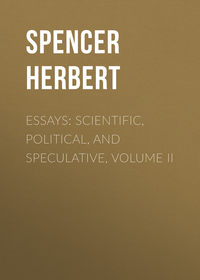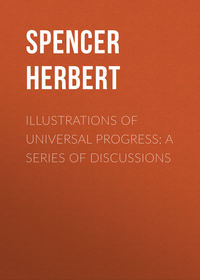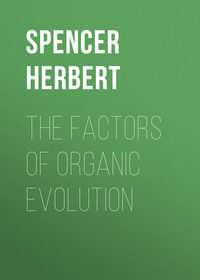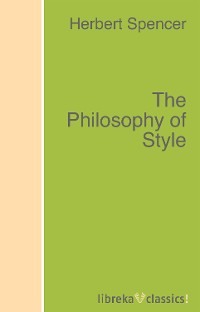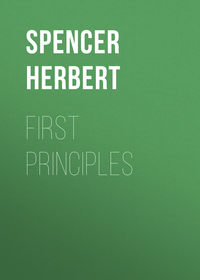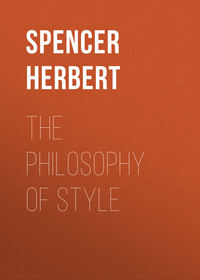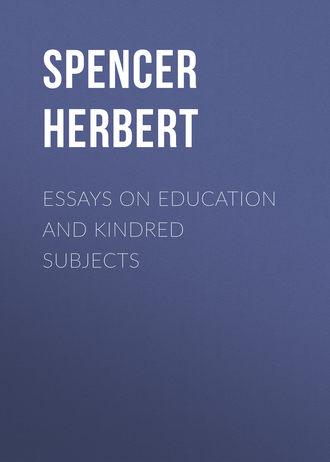 полная версия
полная версияEssays on Education and Kindred Subjects
But now mark, that even supposing an adequate stock of this truly valuable historical knowledge has been acquired, it is of comparatively little use without the key. And the key is to be found only in Science. In the absence of the generalisations of biology and psychology, rational interpretation of social phenomena is impossible. Only in proportion as men draw certain rude, empirical inferences respecting human nature, are they enabled to understand even the simplest facts of social life: as, for instance, the relation between supply and demand. And if the most elementary truths of sociology cannot be reached until some knowledge is obtained of how men generally think, feel, and act under given circumstances; then it is manifest that there can be nothing like a wide comprehension of sociology, unless through a competent acquaintance with man in all his faculties, bodily, and mental. Consider the matter in the abstract, and this conclusion is self-evident. Thus: – Society is made up of individuals; all that is done in society is done by the combined actions of individuals; and therefore, in individual actions only can be found the solutions of social phenomena. But the actions of individuals depend on the laws of their natures; and their actions cannot be understood until these laws are understood. These laws, however, when reduced to their simplest expressions, prove to be corollaries from the laws of body and mind in general. Hence it follows, that biology and psychology are indispensable as interpreters of sociology. Or, to state the conclusions still more simply: – all social phenomena are phenomena of life – are the most complex manifestations of life – must conform to the laws of life – and can be understood only when the laws of life are understood. Thus, then, for the regulation of this fourth division of human activities, we are, as before, dependent on Science. Of the knowledge commonly imparted in educational courses, very little is of service for guiding a man in his conduct as a citizen. Only a small part of the history he reads is of practical value; and of this small part he is not prepared to make proper use. He lacks not only the materials for, but the very conception of, descriptive sociology; and he also lacks those generalisations of the organic sciences, without which even descriptive sociology can give him but small aid.
And now we come to that remaining division of human life which includes the relaxations and amusements filling leisure hours. After considering what training best fits for self-preservation, for the obtainment of sustenance, for the discharge of parental duties, and for the regulation of social and political conduct; we have now to consider what training best fits for the miscellaneous ends not included in these – for the enjoyment of Nature, of Literature, and of the Fine Arts, in all their forms. Postponing them as we do to things that bear more vitally upon human welfare; and bringing everything, as we have, to the test of actual value; it will perhaps be inferred that we are inclined to slight these less essential things. No greater mistake could be made, however. We yield to none in the value we attach to aesthetic culture and its pleasures. Without painting, sculpture, music, poetry, and the emotions produced by natural beauty of every kind, life would lose half its charm. So far from regarding the training and gratification of the tastes as unimportant, we believe that in time to come they will occupy a much larger share of human life than now. When the forces of Nature have been fully conquered to man's use – when the means of production have been brought to perfection – when labour has been economised to the highest degree – when education has been so systematised that a preparation for the more essential activities may be made with comparative rapidity – and when, consequently, there is a great increase of spare time; then will the beautiful, both in Art and Nature, rightly fill a large space in the minds of all.
But it is one thing to approve of æsthetic culture as largely conducive to human happiness; and another thing to admit that it is a fundamental requisite to human happiness. However important it may be, it must yield precedence to those kinds of culture which bear directly upon daily duties. As before hinted, literature and the fine arts are made possible by those activities which make individual and social life possible; and manifestly, that which is made possible, must be postponed to that which makes it possible. A florist cultivates a plant for the sake of its flower; and regards the roots and leaves as of value, chiefly because they are instrumental in producing the flower. But while, as an ultimate product, the flower is the thing to which everything else is subordinate, the florist has learnt that the root and leaves are intrinsically of greater importance; because on them the evolution of the flower depends. He bestows every care in rearing a healthy plant; and knows it would be folly if, in his anxiety to obtain the flower, he were to neglect the plant. Similarly in the case before us. Architecture, sculpture, painting, music, and poetry, may truly be called the efflorescence of civilised life. But even supposing they are of such transcendent worth as to subordinate the civilised life out of which they grow (which can hardly be asserted), it will still be admitted that the production of a healthy civilised life must be the first consideration; and that culture subserving this must occupy the highest place.
And here we see most distinctly the vice of our educational system. It neglects the plant for the sake of the flower. In anxiety for elegance, it forgets substance. While it gives no knowledge conducive to self-preservation – while of knowledge that facilitates gaining a livelihood it gives but the rudiments, and leaves the greater part to be picked up any how in after life – while for the discharge of parental functions it makes not the slightest provision – and while for the duties of citizenship it prepares by imparting a mass of facts, most of which are irrelevant, and the rest without a key; it is diligent in teaching whatever adds to refinement, polish, éclat. Fully as we may admit that extensive acquaintance with modern languages is a valuable accomplishment, which, through reading, conversation, and travel, aids in giving a certain finish; it by no means follows that this result is rightly purchased at the cost of the vitally important knowledge sacrificed to it. Supposing it true that classical education conduces to elegance and correctness of style; it cannot be said that elegance and correctness of style are comparable in importance to a familiarity with the principles that should guide the rearing of children. Grant that the taste may be improved by reading the poetry written in extinct languages; yet it is not to be inferred that such improvement of taste is equivalent in value to an acquaintance with the laws of health. Accomplishments, the fine arts, belles-lettres, and all those things which, as we say, constitute the efflorescence of civilisation, should be wholly subordinate to that instruction and discipline in which civilisation rests. As they occupy the leisure part of life, so should they occupy the leisure part of education.
Recognising thus the true position of aesthetics, and holding that while the cultivation of them should form a part of education from its commencement, such cultivation should be subsidiary; we have now to inquire what knowledge is of most use to this end – what knowledge best fits for this remaining sphere of activity? To this question the answer is still the same as heretofore. Unexpected though the assertion may be, it is nevertheless true, that the highest Art of every kind is based on Science – that without Science there can be neither perfect production nor full appreciation. Science, in that limited acceptation current in society, may not have been possessed by various artists of high repute; but acute observers as such artists have been, they have always possessed a stock of those empirical generalisations which constitute science in its lowest phase; and they have habitually fallen far below perfection, partly because their generalisations were comparatively few and inaccurate. That science necessarily underlies the fine arts, becomes manifest, à priori, when we remember that art-products are all more or less representative of objective or subjective phenomena; that they can be good only in proportion as they conform to the laws of these phenomena; and that before they can thus conform, the artist must know what these laws are. That this à priori conclusion tallies with experience, we shall soon see.
Youths preparing for the practice of sculpture have to acquaint themselves with the bones and muscles of the human frame in their distribution, attachments, and movements. This is a portion of science; and it has been found needful to impart it for the prevention of those many errors which sculptors who do not possess it commit. A knowledge of mechanical principles is also requisite; and such knowledge not being usually possessed, grave mechanical mistakes are frequently made. Take an instance. For the stability of a figure it is needful that the perpendicular from the centre of gravity – "the line of direction," as it is called – should fall within the base of support; and hence it happens, that when a man assumes the attitude known as "standing at ease," in which one leg is straightened and the other relaxed, the line of direction falls within the foot of the straightened leg. But sculptors unfamiliar with the theory of equilibrium, not uncommonly so represent this attitude, that the line of direction falls midway between the feet. Ignorance of the law of momentum leads to analogous blunders: as witness the admired Discobolus, which, as it is posed, must inevitably fall forward the moment the quoit is delivered.
In painting, the necessity for scientific information, empirical if not rational, is still more conspicuous. What gives the grotesqueness of Chinese pictures, unless their utter disregard of the laws of appearances – their absurd linear perspective, and their want of aerial perspective? In what are the drawings of a child so faulty, if not in a similar absence of truth – an absence arising, in great part, from ignorance of the way in which the aspects of things vary with the conditions? Do but remember the books and lectures by which students are instructed; or consider the criticisms of Ruskin; or look at the doings of the Pre-Raffaelites; and you will see that progress in painting implies increasing knowledge of how effects in Nature are produced. The most diligent observation, if unaided by science, fails to preserve from error. Every painter will endorse the assertion that unless it is known what appearances must exist under given circumstances, they often will not be perceived; and to know what appearances must exist, is, in so far, to understand the science of appearances. From want of science Mr. J. Lewis, careful painter as he is, casts the shadow of a lattice-window in sharply-defined lines upon an opposite wall; which he would not have done, had he been familiar with the phenomena of penumbræ. From want of science, Mr. Rosetti, catching sight of a peculiar iridescence displayed by certain hairy surfaces under particular lights (an iridescence caused by the diffraction of light in passing the hairs), commits the error of showing this iridescence on surfaces and in positions where it could not occur.
To say that music, too, has need of scientific aid will cause still more surprise. Yet it may be shown that music is but an idealisation of the natural language of emotion; and that consequently, music must be good or bad according as it conforms to the laws of this natural language. The various inflections of voice which accompany feelings of different kinds and intensities, are the germs out of which music is developed. It is demonstrable that these inflections and cadences are not accidental or arbitrary; but that they are determined by certain general principles of vital action; and that their expressiveness depends on this. Whence it follows that musical phrases and the melodies built of them, can be effective only when they are in harmony with these general principles. It is difficult here properly to illustrate this position. But perhaps it will suffice to instance the swarms of worthless ballads that infest drawing-rooms, as compositions which science would forbid. They sin against science by setting to music ideas that are not emotional enough to prompt musical expression; and they also sin against science by using musical phrases that have no natural relations to the ideas expressed: even where these are emotional. They are bad because they are untrue. And to say they are untrue, is to say they are unscientific.
Even in poetry the same thing holds. Like music, poetry has its root in those natural modes of expression which accompany deep feeling. Its rhythm, its strong and numerous metaphors, its hyperboles, its violent inversions, are simply exaggerations of the traits of excited speech. To be good, therefore, poetry must pay attention to those laws of nervous action which excited speech obeys. In intensifying and combining the traits of excited speech, it must have due regard to proportion – must not use its appliances without restriction; but, where the ideas are least emotional, must use the forms of poetical expression sparingly; must use them more freely as the emotion rises; and must carry them to their greatest extent, only where the emotion reaches a climax. The entire contravention of these principles results in bombast or doggerel. The insufficient respect for them is seen in didactic poetry. And it is because they are rarely fully obeyed, that so much poetry is inartistic.
Not only is it that the artist, of whatever kind, cannot produce a truthful work without he understands the laws of the phenomena he represents; but it is that he must also understand how the minds of spectators or listeners will be affected by the several peculiarities of his work – a question in psychology. What impression any art-product generates, manifestly depends upon the mental natures of those to whom it is presented; and as all mental natures have certain characteristics in common, there must result certain corresponding general principles on which alone art-products can be successfully framed. These general principles cannot be fully understood and applied, unless the artist sees how they follow from the laws of mind. To ask whether the composition of a picture is good is really to ask how the perceptions and feelings of observers will be affected by it. To ask whether a drama is well constructed, is to ask whether its situations are so arranged as duly to consult the power of attention of an audience, and duly to avoid overtaxing any one class of feelings. Equally in arranging the leading divisions of a poem or fiction, and in combining the words of a single sentence, the goodness of the effect depends upon the skill with which the mental energies and susceptibilities of the reader are economised. Every artist, in the course of his education and after-life, accumulates a stock of maxims by which his practice is regulated. Trace such maxims to their roots, and they inevitably lead you down to psychological principles. And only when the artist understands these psychological principles and their various corollaries can he work in harmony with them.
We do not for a moment believe that science will make an artist. While we contend that the leading laws both of objective and subjective phenomena must be understood by him, we by no means contend that knowledge of such laws will serve in place of natural perception. Not the poet only, but the artist of every type, is born, not made. What we assert is, that innate faculty cannot dispense with the aid of organised knowledge. Intuition will do much, but it will not do all. Only when Genius is married to Science can the highest results be produced.
As we have above asserted, Science is necessary not only for the most successful production, but also for the full appreciation, of the fine arts. In what consists the greater ability of a man than of a child to perceive the beauties of a picture; unless it is in his more extended knowledge of those truths in nature or life which the picture renders? How happens the cultivated gentleman to enjoy a fine poem so much more than a boor does; if it is not because his wider acquaintance with objects and actions enables him to see in the poem much that the boor cannot see? And if, as is here so obvious, there must be some familiarity with the things represented, before the representation can be appreciated, then, the representation can be completely appreciated only when the things represented are completely understood. The fact is, that every additional truth which a word of art expresses, gives an additional pleasure to the percipient mind – a pleasure that is missed by those ignorant of this truth. The more realities an artist indicates in any given amount of work, the more faculties does he appeal to; the more numerous ideas does he suggest; the more gratification does he afford. But to receive this gratification the spectator, listener, or reader, must know the realities which the artist has indicated; and to know these realities is to have that much science.
And now let us not overlook the further great fact, that not only does science underlie sculpture, painting, music, poetry, but that science is itself poetic. The current opinion that science and poetry are opposed, is a delusion. It is doubtless true that as states of consciousness, cognition and emotion tend to exclude each other. And it is doubtless also true that an extreme activity of the reflective powers tends to deaden the feelings; while an extreme activity of the feelings tends to deaden the reflective powers: in which sense, indeed, all orders of activity are antagonistic to each other. But it is not true that the facts of science are unpoetical; or that the cultivation of science is necessarily unfriendly to the exercise of imagination and the love of the beautiful. On the contrary, science opens up realms of poetry where to the unscientific all is a blank. Those engaged in scientific researches constantly show us that they realise not less vividly, but more vividly, than others, the poetry of their subjects. Whoso will dip into Hugh Miller's works of geology, or read Mr. Lewes's Sea-side Studies, will perceive that science excites poetry rather than extinguishes it. And he who contemplates the life of Goethe, must see that the poet and the man of science can co-exist in equal activity. Is it not, indeed, an absurd and almost a sacrilegious belief, that the more a man studies Nature the less he reveres it? Think you that a drop of water, which to the vulgar eye is but a drop of water, loses anything in the eye of the physicist who knows that its elements are held together by a force which, if suddenly liberated, would produce a flash of lightning? Think you that what is carelessly looked upon by the uninitiated as a mere snow-flake, does not suggest higher associations to one who had seen through a microscope the wondrously-varied and elegant forms of snow-crystals? Think you that the rounded rock marked with parallel scratches, calls up as much poetry in an ignorant mind as in the mind of a geologist, who knows that over this rock a glacier slid a million years ago? The truth is, that those who have never entered upon scientific pursuits are blind to most of the poetry by which they are surrounded. Whoever has not in youth collected plants and insects, knows not half the halo of interest which lanes and hedge-rows can assume. Whoever has not sought for fossils, has little idea of the poetical associations that surround the places where imbedded treasures were found. Whoever at the sea-side has not had a microscope and aquarium, has yet to learn what the highest pleasures of the sea-side are. Sad, indeed, is it to see how men occupy themselves with trivialities, and are indifferent to the grandest phenomena – care not to understand the architecture of the Heavens, but are deeply interested in some contemptible controversy about the intrigues of Mary Queen of Scots! – are learnedly critical over a Greek ode, and pass by without a glance that grand epic written by the finger of God upon the strata of the Earth!
We find, then, that even for this remaining division of human activities, scientific culture is the proper preparation. We find that aesthetics in general are necessarily based upon scientific principles; and can be pursued with complete success only through an acquaintance with these principles. We find that for the criticism and due appreciation of works of art, a knowledge of the constitution of things, or in other words, a knowledge of science, is requisite. And we not only find that science is the handmaid to all forms of art and poetry, but that, rightly regarded, science is itself poetic.
Thus far our question has been, the worth of knowledge of this or that kind for purposes of guidance. We have now to judge the relative value of different kinds of knowledge for purposes of discipline. This division of our subject we are obliged to treat with comparative brevity; and happily, no very lengthened treatment of it is needed. Having found what is best for the one end, we have by implication found what is best for the other. We may be quite sure that the acquirement of those classes of facts which are most useful for regulating conduct, involves a mental exercise best fitted for strengthening the faculties. It would be utterly contrary to the beautiful economy of Nature, if one kind of culture were needed for the gaining of information and another kind were needed as a mental gymnastic. Everywhere throughout creation we find faculties developed through the performance of those functions which it is their office to perform; not through the performance of artificial exercises devised to fit them for those functions. The Red Indian acquires the swiftness and agility which make him a successful hunter, by the actual pursuit of animals; and through the miscellaneous activities of his life, he gains a better balance of physical powers than gymnastics ever give. That skill in tracking enemies and prey which he had reached after long practice, implies a subtlety of perception far exceeding anything produced by artificial training. And similarly in all cases. From the Bushman whose eye, habitually employed in identifying distant objects that are to be pursued or fled from, has acquired a telescopic range, to the accountant whose daily practice enables him to add up several columns of figures simultaneously; we find that the highest power of a faculty results from the discharge of those duties which the conditions of life require it to discharge. And we may be certain, à priori, that the same law holds throughout education. The education of most value for guidance, must at the same time be the education of most value for discipline. Let us consider the evidence.
One advantage claimed for that devotion to language-learning which forms so prominent a feature in the ordinary curriculum, is, that the memory is thereby strengthened. This is assumed to be an advantage peculiar to the study of words. But the truth is, that the sciences afford far wider fields for the exercise of memory. It is no slight task to remember everything about our solar system; much more to remember all that is known concerning the structure of our galaxy. The number of compound substances, to which chemistry daily adds, is so great that few, save professors, can enumerate them; and to recollect the atomic constitutions and affinities of all these compounds, is scarcely possible without making chemistry the occupation of life. In the enormous mass of phenomena presented by the Earth's crust, and in the still more enormous mass of phenomena presented by the fossils it contains, there is matter which it takes the geological student years of application to master. Each leading division of physics – sound, heat, light, electricity – includes facts numerous enough to alarm any one proposing to learn them all. And when we pass to the organic sciences, the effort of memory required becomes still greater. In human anatomy alone, the quantity of detail is so great, that the young surgeon has commonly to get it up half-a-dozen times before he can permanently retain it. The number of species of plants which botanists distinguish, amounts to some 320,000; while the varied forms of animal life with which the zoologist deals, are estimated at some 2,000,000. So vast is the accumulation of facts which men of science have before them, that only by dividing and subdividing their labours can they deal with it. To a detailed knowledge of his own division, each adds but a general knowledge of the allied ones; joined perhaps to a rudimentary acquaintance with some others. Surely, then, science, cultivated even to a very moderate extent, affords adequate exercise for memory. To say the very least, it involves quite as good a discipline for this faculty as language does.




